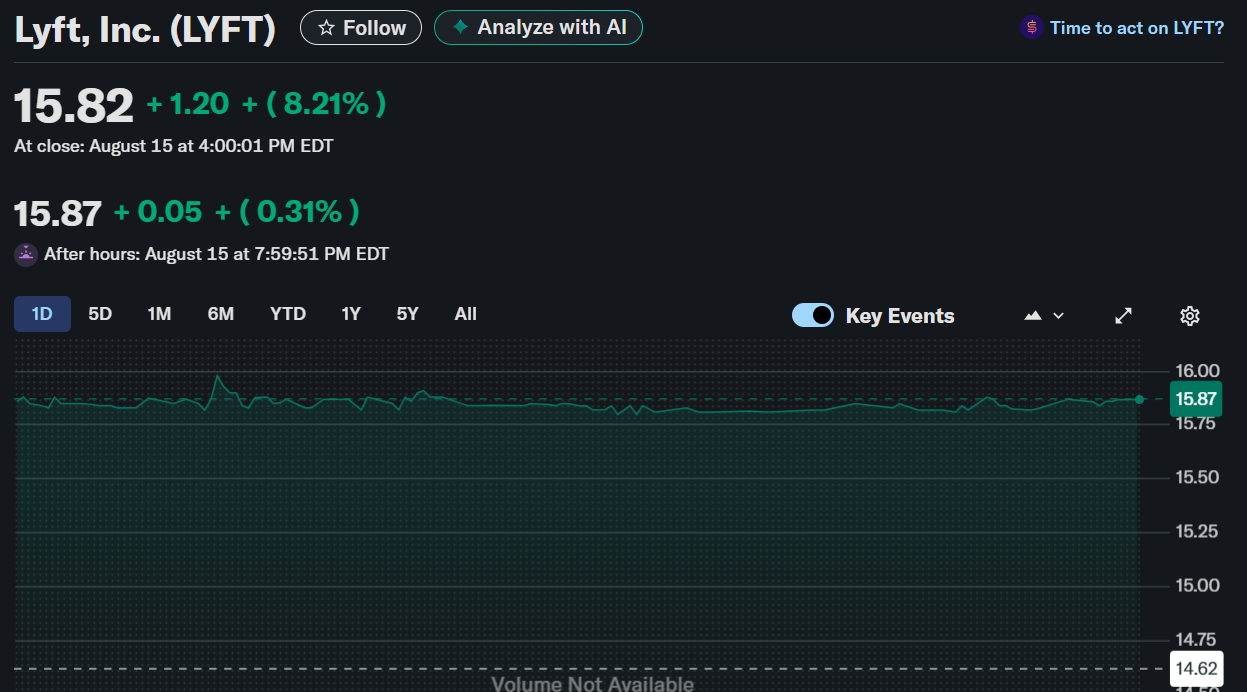TLDR
- Lyft stock closed at $15.82 on August 15, 2025, up 8.21%, and gained slightly in after-hours trading.
- Co-founders Logan Green and John Zimmer will step down from the board in 2026, eliminating the dual-class structure.
- Q2 revenue rose 11% to $1.59 billion; EPS jumped to $0.10, beating expectations.
- Strategic acquisitions and alliances, including FreeNow and Baidu Apollo Go, expand Lyft’s global reach.
- Despite profitability challenges, strong momentum and governance reforms boosted LYFT’s 46% one-year return.
Shares of Lyft, Inc. (NasdaqGS: LYFT) surged 8.21% on August 15, 2025, closing at $15.82, with after-hours trading pushing the price slightly higher to $15.87.

The sharp move came after the company announced significant leadership changes: co-founders Logan Green and John Zimmer will resign from the board of directors in 2026, concluding a two-year transition plan.
The two founders also converted all Class B shares into Class A, ending Lyft’s dual-class structure and introducing a one-share, one-vote standard. Following the conversion, Green and Zimmer now collectively own 9.69 million Class A shares. Sean Aggarwal, who has been with the board since 2016 and served as Chair from 2019–2023, will return as Board Chair.
Lyft Co-Founders to Exit Board, Wrapping Two-Year Succession Plan https://t.co/oSEOA0lQsx
— WSJ Business News (@WSJbusiness) August 14, 2025
Share Restructuring and Governance
Lyft’s board will now be reduced to seven members, with six serving as independent directors. This governance shift is viewed positively by investors, strengthening shareholder voting power and aligning corporate strategy with investor expectations. Analyst sentiment suggests these changes could help Lyft regain ground against its dominant competitor, Uber Technologies.
Financial Performance: Q2 2025
Lyft’s Q2 2025 results demonstrated strong momentum. Revenue grew 11% year-over-year to $1.59 billion, supported by a 12% rise in gross bookings to $4.49 billion. Net income climbed to $40.3 million, while adjusted EBITDA increased 26% to $129.4 million.
Earnings per share surged to $0.10, well above analysts’ consensus estimate of $0.04, highlighting improved cost controls. Free cash flow reached $329.4 million, providing flexibility for share repurchases and strategic investments. Lyft’s 2025 revenue totaled $5.79 billion, but profitability remains pressured, with a negative pre-tax profit margin of -17.6%.
Strategic Expansion and Alliances
Lyft is enhancing its international footprint through acquisitions and partnerships. The purchase of FreeNow strengthens its European ride-hailing presence, while a strategic alliance with Baidu introduces Apollo Go autonomous vehicles in Europe. These initiatives underscore Lyft’s diversification strategy, positioning the company to benefit from the growth of autonomous mobility.
Conclusion
Lyft’s latest earnings and strategic decisions signal an evolving growth story. Governance reforms, European expansion, and autonomous vehicle partnerships position the company for long-term opportunities. While profitability challenges remain, the company’s strong one-year stock performance and bullish technical signals highlight growing investor confidence.








